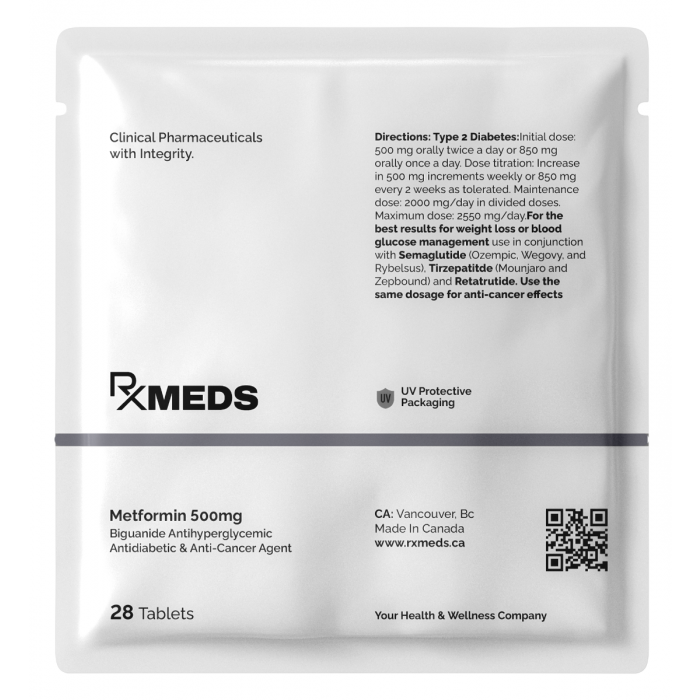Read More
What is Metformin (Glucophage)?
Metformin (brand name: Glucophage) is an oral antidiabetic medication used to manage blood sugar levels in individuals with type 2 diabetes. It works by improving the body’s sensitivity to insulin, reducing glucose production in the liver, and decreasing glucose absorption in the intestines. Metformin is also used off-label for conditions like polycystic ovary syndrome (PCOS) and weight management in certain cases.
Metformin is available in immediate-release and extended-release formulations.
- Generic name: metformin hydrochloride
- Brand names: Glucophage, Glucophage XR, Fortamet, Glumetza
- Drug classes: Biguanides
Warnings
- Do not use metformin if you have severe kidney disease or are undergoing dialysis.
- Metformin may cause lactic acidosis, a rare but serious condition characterized by a buildup of lactic acid in the blood. Seek immediate medical attention if you experience symptoms like muscle pain, weakness, difficulty breathing, or unusual fatigue.
- Avoid using metformin during severe infections, dehydration, or if you are undergoing imaging studies with iodinated contrast dyes.
- Consult your healthcare provider before using metformin if you have liver disease or heart failure.
Before Using This Product
- Inform your healthcare provider if you have a history of kidney or liver disease, heart conditions, or vitamin B12 deficiency.
- Disclose any medications you are taking, including insulin or other antidiabetic drugs, as dosage adjustments may be needed.
- Do not use metformin if you have type 1 diabetes or diabetic ketoacidosis.
How Should I Take Metformin (Glucophage)?
- Dosage: Initial doses typically range from 500 mg to 850 mg once or twice daily, gradually increased as needed, up to a maximum of 2,000–2,500 mg per day.
- With Food: Take metformin with meals to reduce the risk of gastrointestinal side effects.
- Extended-Release: Swallow extended-release tablets whole; do not crush or chew them.
What Happens If I Miss a Dose?
- Take the missed dose as soon as you remember, unless it is close to the next scheduled dose.
- If it is almost time for the next dose, skip the missed dose and continue with your regular schedule.
- Do not double doses to make up for a missed dose.
What Happens If I Overdose?
- Symptoms of overdose may include severe nausea, vomiting, diarrhea, or symptoms of lactic acidosis such as muscle pain, difficulty breathing, or extreme fatigue.
- Seek emergency medical attention if you suspect an overdose.
What to Avoid
- Avoid consuming excessive alcohol while taking metformin, as this increases the risk of lactic acidosis.
- Avoid high-sugar or high-carbohydrate diets that may counteract the effects of metformin.
- Avoid skipping meals, as this can cause low blood sugar when combined with other diabetes medications.
Metformin Side Effects
Common side effects may include:
- Nausea
- Diarrhea
- Stomach pain
- Loss of appetite
- Metallic taste in the mouth
Seek immediate medical attention if you experience severe or unusual symptoms, such as:
- Signs of lactic acidosis (e.g., muscle pain, weakness, difficulty breathing)
- Severe allergic reactions, such as swelling of the face, lips, or tongue
- Severe abdominal pain or persistent vomiting
 |
|
